FolkWorld article by Susanne Kalweit:
"I WOULDN'T CHANGE A THING!"
40 years of Iain MacKintosh
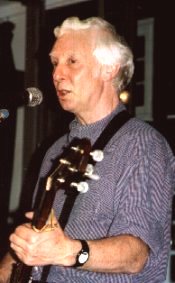 I can't believe it's thirty years since three of us teamed up
I can't believe it's thirty years since three of us teamed up
Won a folk group competition - I've still got that silver cup
In a basement club in Bath Street for me it did begin
Songs from Archie, Alex Campbell, Josh MacRae and Matt McGinn
I played a bingo hall in Wishaw, a church hall in Polmadie
The more I sang the more I thought, Aye, that's the life for me
I don't remember where it was, but someone paid us once
Between you and me - I havnae done an honest day's work since
An audition at the Ashfield Club, with three songs up our sleeves
The boy said, Lads, don't waste my time, can ye no dae some Jim Reeves?
Then I got my first TV show from the Elbow Room in Fife
Sometimes I think that Gordon Smith (the producer!) was the man who changed my life
Time went on and line-ups changed, one group became another
Jackie, Gavin, Bobby, Tam - I loved them like my brothers
Then one day I thought I'd like to try it on my own
And a whole new world just opened up when I stood up there alone
It didnae take me long to find the songs I liked to do
Mostly songs by other folk, though I did write one or two
I sang some Harry Chapin songs, somehow they seemed to suit
And the Glasgow songs by Adam to remind me of my roots
I learned a lot from Hamish too, not just how to drink
There's much more to the big man than a lot of people think
He can mickey mouse the public bar or captivate with blues
Takes three men to fill his trousers - but no one fills his shoes
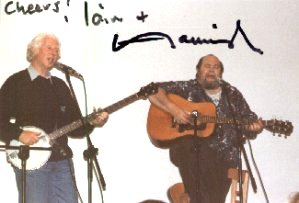 Some other special friends, of course, they know how I feel
Some other special friends, of course, they know how I feel
There's Allan Taylor, Alan Reid, 'Cecil B.' McNeill
Arthur Johnstone, Rod from Denmark, and the Sands from Ireland too
Jesus - this verse was a big mistake, I can't name all of you
Some virtuoso players - think of Aly, think of Phil
As we sometimes say in Glasgow - that music's pure dead brill
A couple of us made it big - Billy, Babs got rich
Some of us just made it small - Danny, me, and Tich
My family were wonderful, my daughters and my wife
They knew how much I loved this job and enjoyed the travelling life
We smiled through the good times, and they helped me through the rough
Though tempted, they never once said, Take your banjo and piss off
There's never a dull moment now, the tours come rolling in
Baltimore to Bielefeld, Bermuda tae Berlin
No, I can't believe it's thirty years since I began to sing
But if I had to do it all again, I wouldnae change a thing
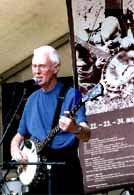 This musical autobiography in five verses is one of the best-loved
items in Iain MacKintosh's repertoire. He claims to have written it
'within half an hour' when he turned sixty - to cheer himself up, he
says, and to remind himself of all the good things his life as a
travelling folksinger has brought him. (How just like him to maintain
a discreet silence on the downsides!)
This musical autobiography in five verses is one of the best-loved
items in Iain MacKintosh's repertoire. He claims to have written it
'within half an hour' when he turned sixty - to cheer himself up, he
says, and to remind himself of all the good things his life as a
travelling folksinger has brought him. (How just like him to maintain
a discreet silence on the downsides!)
'I Wouldn't Change A Thing' is not only a very personal account of
Iain's forty-year career. It also says a lot about the man whose most
conspicuous character trait is his inconspicuousness. A rave review in
a German newspaper started with the words: 'When he came in you could
have taken him for the janitor ...' Simplicity, authenticity and a
capacity for self-mockery have made him a favourite with his
audiences. In November 1999 he announced - inconspicuously - that he
was going to retire from touring.
Even though he started learning to play the highland pipes at the age
of seven, and played in a prize-winning pipe band for years, a musical
career was not on the cards from the start. The war, which hit his
native Glasgow hard, and his mother's death when he was twelve were
formative experiences of his childhood. From 1944, his formidable
grandmother brought him and his three sisters up. The boy learned a
proper trade - watchmaker and goldsmith - and went to work in his
father's firm.
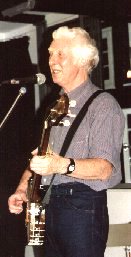 He prefers not to remember his military service; however, it was here
that he was taught his first riffs on the guitar. In the late Fifties
he went to a Pete Seeger concert in Glasgow. The down-to-earth,
American banjo player who would even cut wood on stage if it served
his music made such a tremendous impression on Iain that he went and
bought a banjo. He had found his instrument. He joined the emerging
Scottish folk scene and discovered there were models to be found
nearer home: Alex Campbell who introduced Europe to British folk
music, Josh MacRae who got the first folk song into the charts with
'Messing About on the River', and that writer of both humorous and
overtly political songs, Matt McGinn.
He prefers not to remember his military service; however, it was here
that he was taught his first riffs on the guitar. In the late Fifties
he went to a Pete Seeger concert in Glasgow. The down-to-earth,
American banjo player who would even cut wood on stage if it served
his music made such a tremendous impression on Iain that he went and
bought a banjo. He had found his instrument. He joined the emerging
Scottish folk scene and discovered there were models to be found
nearer home: Alex Campbell who introduced Europe to British folk
music, Josh MacRae who got the first folk song into the charts with
'Messing About on the River', and that writer of both humorous and
overtly political songs, Matt McGinn.
Unlike fellow musicians like Hamish Imlach or Archie Fisher and his
sisters Cilla and Ray, who were born into the British folk revival and
started playing more or less professionally while still in their
teens, Iain was in his late twenties when he formed his first band. In
1960 'The Islanders' emerged. They were, or so Iain says, 'not very
good, but successful'. These things happen. If you know, however, that
he is his own severest critic, this harsh judgment may be taken with a
grain of salt.
For ten years, Iain played in different bands; 'The Islanders' were
followed by 'The Skerries' and 'The Other Half'. At the same time, he
made a name for himself as session musician on other people's albums,
among them 'Gaberlunzie' and Hamish Imlach, who would later write, in
his introduction to Iain's first solo album: 'I have heard Iain in
various groups over many years. They have always been good groups,
although I did not at first understand why. Iain was always in the
background, introspective, and the audience would not notice him
playing really sensitive music ... When he started singing and playing
himself, I was first amazed, then jealous, and then sat back and
enjoyed listening.'
 After long 'apprenticeship', in 1970 Iain decided to leave the
background and earn his money as a solo artist. Economic change in
Scotland may have contributed to the decision to close down the
parental business which Iain had been running with his wife Sadie from
1960. However, it was probably the growing demand on his time by his
second job that made a decision between the two necessary. For his
wife and his two daughters life with a constantly absent father can't
have been exactly easy. From 1973, he was increasingly touring Germany
and other European countries, and also the United States - often nine
months out of twelve. Sadie kept the home running. She doesn't speak
about what this meant for her. Daughters Isla and Fiona do admit to
occasionally being embarrassed by having to give their father's job as
'folksinger' in school. Isla preferred to state he was a plumber
instead, while Fiona, if she knew her father was appearing on TV, e.g.
in the series 'A Better Class of Folk' hosted by Dominic Behan, would
steer her schoolfellows to a café that didn't have a set.
After long 'apprenticeship', in 1970 Iain decided to leave the
background and earn his money as a solo artist. Economic change in
Scotland may have contributed to the decision to close down the
parental business which Iain had been running with his wife Sadie from
1960. However, it was probably the growing demand on his time by his
second job that made a decision between the two necessary. For his
wife and his two daughters life with a constantly absent father can't
have been exactly easy. From 1973, he was increasingly touring Germany
and other European countries, and also the United States - often nine
months out of twelve. Sadie kept the home running. She doesn't speak
about what this meant for her. Daughters Isla and Fiona do admit to
occasionally being embarrassed by having to give their father's job as
'folksinger' in school. Isla preferred to state he was a plumber
instead, while Fiona, if she knew her father was appearing on TV, e.g.
in the series 'A Better Class of Folk' hosted by Dominic Behan, would
steer her schoolfellows to a café that didn't have a set.
As a solo artist, Iain has always been political, though he is no
agitator. The songs he likes best are the ones with a subtle political
message. This may account for his passion for story songs. He doesn't
care where he picks them up - whether at home in Glasgow, from Adam
McNaughtan who not only wrote the hilarious 'Oor Hamlet' but also
'Blood Upon the Grass', on the murder of Victor Jara, or in the States
from where he has brought back and 'scottified' many of his best-known
songs. He has a particular liking for Harry Chapin, the late American
singer-songwriter and co-founder of World Hunger. Whenever Iain sang a
particularly impressive or moving new song you could almost be sure
that the author was Harry Chapin. After Harry's premature death, his
wife had a tape of songs he left behind sent to Iain MacKintosh. She
didn't know Iain but she had heard that he was keeping Harry's name
and songs alive.
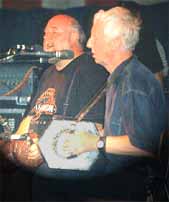 Iain's professional work with the sadly missed Hamish Imlach turned
into a lifelong friendship, although - or perhaps because - this was a
meeting of absolute opposites: On the one hand the spare, quiet,
self-contained aesthete, careful with money, abhorring cigarettes and
hardly ever seen drinking; on the other hand the large, generous
bohémien who would freely admit his addiction to good food, alcohol,
nicotine and other people's company. As in life, this contrast had its
effect on stage when Iain and Hamish started performing as a duo.
Iain's professional work with the sadly missed Hamish Imlach turned
into a lifelong friendship, although - or perhaps because - this was a
meeting of absolute opposites: On the one hand the spare, quiet,
self-contained aesthete, careful with money, abhorring cigarettes and
hardly ever seen drinking; on the other hand the large, generous
bohémien who would freely admit his addiction to good food, alcohol,
nicotine and other people's company. As in life, this contrast had its
effect on stage when Iain and Hamish started performing as a duo.
Unlike Hamish, Iain has never been a focal point for the folk scene.
He is too private for that, and is too little interested in some of
the accompanying features of the scene. Also, he soon discovered songs
that could be called folk songs only by virtue of his presentation. In
spite of all this he enjoys the friendship of many fellow musicians,
whether they be stars like Allan Taylor, Alan Reid, Brian McNeill or
the Sands Family, or people like Arthur Johnstone who, as the
long-standing 'engine room' of Glasgow's Star Folk Club, helped to
keep the music alive at grassroots level. Incidentally, the Star Club
voted Iain 'folksinger of the year' several times in his career.
For some fellow musicians, Iain has become a kind of father figure by
virtue of his age and experience. Who would have guessed that among
the musical influences on 'Wolfstone' must be counted 'Uncle Iain',
who many a night played the sons of his good friend Peter Eaglesham to
sleep with his banjo and thus helped foster their interest in the
music. However, Iain also tells the story against himself of how, many
years ago, he tried in vain to convince a fifteen-year-old who had run
away from school in order to join his brother's band, of the
advantages of getting an education. Runaway Phil Cunningham went on to
become Scotland's accordion wizard (and one of Iain's musical heroes)
and probably never once missed his unfinished education.
 However, in folk music, as everywhere, you don't become a star simply
by being a virtuoso player. You also need luck, a sense of showmanship
off as well as on stage, and perhaps more readiness to adapt to
audiences' expectations than Iain was willing to bring to his job.
That's why he never got his big break, unlike, for instance,
long-haired stand-up comic Billy Connolly who started out as a
folksinger with 'The Humblebums' at roughly the same time as Iain.
There is no indication, however, that Iain envies him his material
success and his world-wide popularity.
However, in folk music, as everywhere, you don't become a star simply
by being a virtuoso player. You also need luck, a sense of showmanship
off as well as on stage, and perhaps more readiness to adapt to
audiences' expectations than Iain was willing to bring to his job.
That's why he never got his big break, unlike, for instance,
long-haired stand-up comic Billy Connolly who started out as a
folksinger with 'The Humblebums' at roughly the same time as Iain.
There is no indication, however, that Iain envies him his material
success and his world-wide popularity.
Iain has got his own highlights: He feels at home with what he is
singing and doing because he knows he is doing it well and it fits his
character. Although rather self-contained, he is loved by many people.
He seems to have had virtually no bad reviews. One reviewer once wrote
of 'the Rev. Iain MacKintosh', an allusion to his almost priest-like
demeanour on stage, and then went on to speak of 'the Revered Iain
MacKintosh'. Maybe there was a grain of irony hidden away in this, for
on the other hand - on stage and even more so off it - Iain is known
as one of the best tellers of bawdy stories on the scene. Many of his
fans will remember their sense of shock when they first heard this
serious, quiet man who seemed like every mother-in-law's dream render
'Let's Do It', the 'Mermaid Song' or any one of his many bawdy songs
with that charmingly impudent grin of his.
One frequent topic among MacKintosh fans concerns the question: What
makes him the stage presence he is? The man is no banjo (or
concertina, or bagpipe) virtuoso - as he would be the first to admit.
His voice is agreeable, but not great. He is no eccentric in either
apparel or demeanour. During his concerts nothing happens. He just
stands there on stage, moves his fingers to play the banjo, moves his
mouth to sing, and uses facial expressions - sparingly - to project
moods. And yet, there is such a lot going on between him and his
audience.
 I remember a conference of young 'greens' where Iain MacKintosh was
engaged to open for a rock band. Two hundred ecologically-minded teens
and twens were watching silently as a white-haired man in his late
fifties, clad in jeans and a blue pullover, climbed the steps to the
stage, banjo in hand. Applause was sparse, but when the second song
provided some semblance of an 'Irish' rhythm, some felt bold enough to
clap along. Before the next song, the man on stage, who must have
seemed fairly elderly to his young audience, looked around him and
explained gently, but with a wink, 'Listen, it's o.k. to clap along.
Just remember it doesn't fit every song!' There was no more clapping
along, whether fitting or not, but at the end Iain had to do three
encores and finally left the stage pointing out - typically for his
attitude to fellow musicians - that it would be unfair to let the rock
band wait any longer. His audience started a spontaneous collection to
pay for his hotel and asked him to stay on and do another gig to round
up the conference two days later. He agreed on the spot.
I remember a conference of young 'greens' where Iain MacKintosh was
engaged to open for a rock band. Two hundred ecologically-minded teens
and twens were watching silently as a white-haired man in his late
fifties, clad in jeans and a blue pullover, climbed the steps to the
stage, banjo in hand. Applause was sparse, but when the second song
provided some semblance of an 'Irish' rhythm, some felt bold enough to
clap along. Before the next song, the man on stage, who must have
seemed fairly elderly to his young audience, looked around him and
explained gently, but with a wink, 'Listen, it's o.k. to clap along.
Just remember it doesn't fit every song!' There was no more clapping
along, whether fitting or not, but at the end Iain had to do three
encores and finally left the stage pointing out - typically for his
attitude to fellow musicians - that it would be unfair to let the rock
band wait any longer. His audience started a spontaneous collection to
pay for his hotel and asked him to stay on and do another gig to round
up the conference two days later. He agreed on the spot.
At his gigs he avoids mickey mouse stuff and loudness; the stronger
the effect if he - very rarely - does turn up the volume. Usually,
however, he succeeds in getting his meaning across without raising his
voice. It is songs about social problems, injustice, or human
tragedies that give an inkling of the man behind the balanced stage
performer - a man who is very sensitive and capable of strong
reactions to the world around him, but also one who prefers to keep
his thoughts and feelings to himself. Off stage, too, he is not one to
argue or waste energy on, to him, fruitless debate. For the other
side, this can at times be rather frustrating.
 In the same way, his simple, downright naïve air is only part of the
truth. The admiration he meets with still fills him with wonder, for
although he has a healthy self-regard he does not see himself as
someone special. On the other hand, he is sensitive to being
patronised or treated unfairly, and weighs the pros and cons of
starting a row about it. The usual answer is 'no', even if this means
financial loss, but he doesn't forget. Having said this, there are a
number of venues, mainly Scottish clubs, who can remember Iain waiving
his fee and saying, 'Give me what you can afford'. In Scotland in
particular, the music means more to him than personal gain.
In the same way, his simple, downright naïve air is only part of the
truth. The admiration he meets with still fills him with wonder, for
although he has a healthy self-regard he does not see himself as
someone special. On the other hand, he is sensitive to being
patronised or treated unfairly, and weighs the pros and cons of
starting a row about it. The usual answer is 'no', even if this means
financial loss, but he doesn't forget. Having said this, there are a
number of venues, mainly Scottish clubs, who can remember Iain waiving
his fee and saying, 'Give me what you can afford'. In Scotland in
particular, the music means more to him than personal gain.
This summer Iain MacKintosh turned 68. Recent years were not without
their problems. The death of Hamish Imlach in 1996 hit him hard. On
the other hand, he has formed a new musical partnership with ace
musician / songwriter and fellow Scot Brian McNeill which both seem to
enjoy hugely. It was never meant to be permanent, however, even though
they have made a CD together; a live CD will be coming out later this
year. Finally, after last year's big flu epidemic, Iain was discharged
from hospital with some friendly advice from his doctor to avoid
smoke-filled rooms.
He intends to follow this advice. From next year he plans to be at
home much more often, look after his family - not least his three
young 'grandweans' - and play only when he feels like it. In October
he will be doing a farewell tour of Germany, the country where (next
to his Scottish homeland) his art has been most widely appreciated.
Many people will miss his concerts where nothing ever happens.
Discography:

Albums:
- (A) By Request (1974)
- (B) Encore (1975)
- (C) A Man's A Man (1978) with Hamish Imlach
- (D) Straight To The Point (1979)
- (E) Live In Glasgow (1979)
- (F) Singing From The Inside (1981)
- (G) Home For A While (1984)
- (H) Live In Hamburg (1986) with Hamish Imlach
- (I) Standing Room Only (1986)
- (J) Gentle Persuasion (1988)
- (K) Risks and Roses (1991) CD
- (L) Just My Cup of Tea (1991) CD
- (M) Stage By Stage (1995) CD with Brian McNeill
Tracks on the following albums:
- Interfolk Festival vol. 4 (1973) OA, first appearance in Germany
- A Better Class of Folk (1974) OA, album of TV series
- The Greatest Ceilidh Band On Earth (1981) OA live at Tønder Festival
- Songs For Peace (1983) OA
- Freedom Come All Ye (1986) tracks from (E)
- I Was Born In Glasgow (1991) OA
- The Music & Song of Edinburgh (1995?) CD tracks from (M)
 Session musician on the following albums:
Session musician on the following albums:
- Hamish Imlach Ballads of Booze (1967)
- Hamish Imlach Fine Old English Tory Times (1972)
- Hamish Imlach Murdered Ballads (1973)
- Gaberlunzie Freedom's Sword (1974)
- Gaberlunzie Wind & Water, Time & Tide (1976)
- Hamish Imlach Scottish Sabbath (1976)
- Hans Theessink Titanic (1981)
- Hamish Imlach Sonny's Dream (1985)
- Arthur Johnstone North By North (1989)
- Brian McNeill The Back o' the North Wind (1991) CD
- Rod Sinclair Breaks and Bonds (1992) CD
Photo Credit: All photos by The Mollis:
(2, 5, 9) Iain & Hamish Imlach
(3, 7) Iain at the opening of the 25th Tønder festival in 1999 in front of a poster of the 1st Tønder festival
(6, 11) Iain & Brian McNeill
Back to the content of FolkWorld Articles, Live Reviews & Columns
To the content of FolkWorld online magazine Nr. 15
© The Mollis - Editors of FolkWorld; Published 08/2000
All material published in FolkWorld is © The Author via FolkWorld. Storage for private use is allowed and welcome. Reviews and extracts of up to 200 words may be freely quoted and reproduced, if source and author are acknowledged. For any other reproduction please ask the Editors for permission.
FolkWorld - Home of European Music

Layout & Idea of FolkWorld © The Mollis - Editors of FolkWorld
 I can't believe it's thirty years since three of us teamed up
I can't believe it's thirty years since three of us teamed up Some other special friends, of course, they know how I feel
Some other special friends, of course, they know how I feel This musical autobiography in five verses is one of the best-loved
items in Iain MacKintosh's repertoire. He claims to have written it
'within half an hour' when he turned sixty - to cheer himself up, he
says, and to remind himself of all the good things his life as a
travelling folksinger has brought him. (How just like him to maintain
a discreet silence on the downsides!)
This musical autobiography in five verses is one of the best-loved
items in Iain MacKintosh's repertoire. He claims to have written it
'within half an hour' when he turned sixty - to cheer himself up, he
says, and to remind himself of all the good things his life as a
travelling folksinger has brought him. (How just like him to maintain
a discreet silence on the downsides!)
 He prefers not to remember his military service; however, it was here
that he was taught his first riffs on the guitar. In the late Fifties
he went to a Pete Seeger concert in Glasgow. The down-to-earth,
American banjo player who would even cut wood on stage if it served
his music made such a tremendous impression on Iain that he went and
bought a banjo. He had found his instrument. He joined the emerging
Scottish folk scene and discovered there were models to be found
nearer home: Alex Campbell who introduced Europe to British folk
music, Josh MacRae who got the first folk song into the charts with
'Messing About on the River', and that writer of both humorous and
overtly political songs, Matt McGinn.
He prefers not to remember his military service; however, it was here
that he was taught his first riffs on the guitar. In the late Fifties
he went to a Pete Seeger concert in Glasgow. The down-to-earth,
American banjo player who would even cut wood on stage if it served
his music made such a tremendous impression on Iain that he went and
bought a banjo. He had found his instrument. He joined the emerging
Scottish folk scene and discovered there were models to be found
nearer home: Alex Campbell who introduced Europe to British folk
music, Josh MacRae who got the first folk song into the charts with
'Messing About on the River', and that writer of both humorous and
overtly political songs, Matt McGinn.
 Iain's professional work with the sadly missed Hamish Imlach turned
into a lifelong friendship, although - or perhaps because - this was a
meeting of absolute opposites: On the one hand the spare, quiet,
self-contained aesthete, careful with money, abhorring cigarettes and
hardly ever seen drinking; on the other hand the large, generous
bohémien who would freely admit his addiction to good food, alcohol,
nicotine and other people's company. As in life, this contrast had its
effect on stage when Iain and Hamish started performing as a duo.
Iain's professional work with the sadly missed Hamish Imlach turned
into a lifelong friendship, although - or perhaps because - this was a
meeting of absolute opposites: On the one hand the spare, quiet,
self-contained aesthete, careful with money, abhorring cigarettes and
hardly ever seen drinking; on the other hand the large, generous
bohémien who would freely admit his addiction to good food, alcohol,
nicotine and other people's company. As in life, this contrast had its
effect on stage when Iain and Hamish started performing as a duo.
